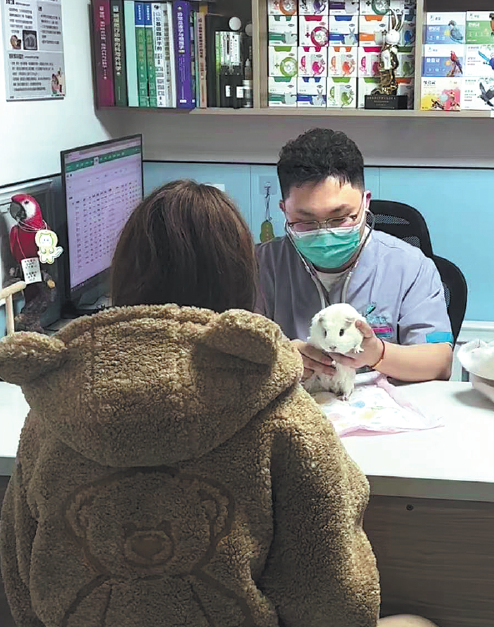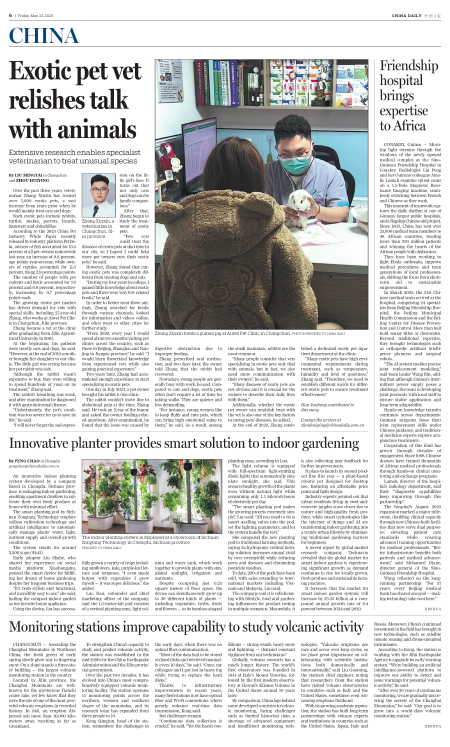
Zhang Xinxin, a veterinarian in Changchun, Jilin province.

Zhang Xinxin treats a guinea pig at Aiwei Pet Clinic in Changchun.
Over the past three years, veterinarian Zhang Xinxin has treated over 5,000 exotic pets, a vast increase from years prior when he would mainly treat cats and dogs.
Such exotic pets include rabbits, turtles, snakes, parrots, lizards, hamsters and chinchillas.
According to the 2025 China Pet Industry White Paper recently released by industry platform PetData, owners of fish accounted for 13.4 percent of all pet owners nationwide last year, an increase of 0.6 percentage points year-on-year, while owners of reptiles accounted for 11.3 percent, rising 2.9 percentage points.
The number of people with pet rodents and birds accounted for 7.8 percent and 6.8 percent, respectively, increasing by 0.7 percentage points each.
The growing exotic pet market has driven demand for vets with special skills, including 27-year-old Zhang, who works at Aiwei Pet Clinic in Changchun, Jilin province.
Zhang became a vet at the clinic after graduating from Jilin Agricultural University in 2019,
At the beginning, his patients were mostly cats and dogs, he said. "However, at the end of 2019 a mother brought her daughter to our clinic. The little girl was crying because her pet rabbit was sick.
"Although the rabbit wasn't expensive to buy, they were willing to spend hundreds of yuan on its treatment," Zhang said.
The rabbit's breathing was weak, and after examination he diagnosed it with gastrointestinal disease.
"Unfortunately, the pet's condition was too severe for us to save its life," he said.
"I will never forget the sad expression on the little girl's face. It turns out that not only cats and dogs can be family companions."
After that, Zhang began to study the treatment of exotic pets.
"Few vets could treat the diseases of exotic pets at that time in our city, so I hoped I could help more pet owners cure their exotic pets," he said.
However, Zhang found that curing exotic pets was completely different from treating dogs and cats.
"During my four years in college, I gained little knowledge about exotic pets and there were very few related books," he said.
In order to better treat these animals, Zhang searched for books through various channels, looked for information and videos online, and often went to other cities for further study.
"From 2020, every year I would spend about two months visiting pet clinics across the country, such as those in Beijing, Shanghai and Nanjing in Jiangsu province," he said. "I would learn theoretical knowledge from experienced vets while also gaining practical experience."
Two years later, Zhang had accumulated enough experience to start specializing in exotic pets.
One day in July 2022, a pet owner brought his rabbit to the clinic.
The rabbit couldn't move due to abdominal pain at the time, Zhang said. He took an X-ray of the bunny and asked the owner feeding-related questions. After examination, he found that the issue was caused by digestive obstruction due to improper feeding.
Zhang prescribed oral medication, and two days later, the owner told Zhang that the rabbit had recovered.
Nowadays, young people are generally busy with work, he said. Compared to cats and dogs, exotic pets often don't require a lot of time for taking walks. They are quieter and less demanding.
"For instance, young women like to keep fluffy and cute pets, which can bring high emotional value to them," he said. As a result, among the small mammals, rabbits are the most common.
"Many people consider that vets specializing in exotic pets only deal with animals, but in fact, we also need more communication with their owners," he said.
"Many diseases of exotic pets are not obvious and it is crucial for the owners to describe their daily lives with them."
Additionally, whether the exotic pet owner can establish trust with the vet is also one of the key factors in curing pets' diseases, he added.
At the end of 2023, Zhang established a dedicated exotic pet inpatient department at the clinic.
"Many exotic pets have high environmental requirements during treatment, such as temperature, humidity and level of quietness," Zhang said. "Therefore, we need to establish different wards for different exotic pets to ensure treatment effectiveness."
Contact the writers at zhouhuiying@chinadaily.com.cn

